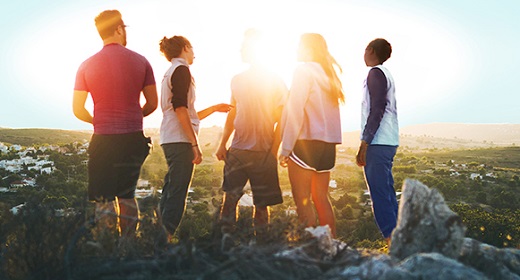by Samuel Paul Veissière Ph.D: 5 ways our world is a bit better from the global response to the pandemic…

On February 27, as mass anxiety about the Coronavirus was beginning to spread, I wrote a post on the evolutionary dimensions of human propensity to over-interpret danger, and on the social, economic, and psychological risks posed by epidemic panic. My take at the time was that the global anxiety was disproportionate relative to the actual threat posed by the virus. Fear has escalated sharply in the past two weeks, and it has become difficult to offer reassuring news without conveying false hopes that may put vulnerable people at risk. But in these times of uncertainty, we also need to pause and celebrate some of the positive changes that have already occurred on an unprecedented scale.
1. We are no longer inattentive to what matters. Illnesses and accidents always trigger a cascade of unexpected positive events. First, they tend to channel our attention toward things we usually take for granted. Paradoxically, it is not until things break down that we start appreciating them – or even remembering that they exist. People with asthma, for example, speak of how grateful they are for the wonders of air and breathing. A broken leg or a broken car can make us appreciate the privilege of free movement. Or again, an unexpected inability to move effortlessly can trigger a wave of friends and relatives offering to help with a ride or a grocery store run. It is from these minor mishaps that we come to remember our loved ones, and create or renew rituals like car-pooling, long walks with friends, or having meals together. Illnesses and accidents are also blessings for bringing families, friends, and communities together.
The mass anxiety, extreme measures, and manic media coverage around the COVID-19 event have drastically restructured our attention toward many crucial features of our lives. We are now more mindful of our health and thankful for our bodies. We are reminded of all the vulnerable populations in our societies, and how much we care about them. We are more cognizant of, and grateful for the complex chains of production, supply, maintenance, and care without which our societies couldn’t exist. Most crucially, we are now reminded that we have, and that we are, a global society. Caring for one another is what allowed our species to survive and thrive against all odds. In remembering that our lives are intrinsically connected, and in taking note of the fragility of the world we took for granted, we are also reminded of how precious we are to one another.
2. Cooperation is spreading on an unprecedented global scale. Before the panic around COVID-19 mobilized our attention, the Western world was already facing an epidemic of anxiety, loneliness, mental illness, and rising uncertainty about the future. From politics gone mad to climate change, from the culture wars to the sex recession, new deaths of despair, and social media feeds exploiting our mental vulnerabilities, the symptoms of rampant individualism were already ravaging our lives. In many ways, the conditions for a global panic and mental health crisis were already in place. The COVID-19 epidemic is providing a timely antidote to all of this.
As we are all focusing on what matters most, the vital importance of coordination and cooperation has become a reality again. Those same cognitive biases for negative information that make us obsess about potential threats are at play when we choose what to read, report on, or think about in these times of uncertainties. Hypothetical scenarios of collapsing health systems and millions dying, or rare incidents of panic hoarding mobilize our attention and go viral online. What we forget to notice, and what never gets reported on or shared on social media, is the cooperative business of life as usual: people patiently waiting their turn and taking precautions to protect the weak, ongoing acts of kindness among strangers, friends checking in on each other, families spending time together, volunteers delivering food to elders. On a much bigger scale, world governments are now coordinating preventive measures with a degree of cooperation never seen before. China has deployed doctors and public health experts to assist Italy with the ongoing crisis. Israelis and Palestinians are uniting to fight the epidemic. Governments around the world are implementing economic measures to assist the economically vulnerable.
3. The global pandemic is expanding our psychology. Natural disasters typically bring people together and prompt spontaneous acts of solidarity among strangers. In the past, pandemics have often proven to be a sad exception to this rule, with fear of contagion increasing xenophobia, discrimination, conflict, and competition for resources. But humanity seems to have learned from past mistakes.
Expanding the bounds of our tribalistic – but ultimately altruistic — psychology has always been humanity’s greatest challenge. Our species evolved in extremely harsh conditions that required carefully executed cooperation within small groups. Human history has been one of expanding, and failing to exploit the full potential of this cooperative nature. As our worlds became more integrated following population increases in the late Neolithic, conquest, war, and slavery — but also exchange, trade, dialogue, and diversification — have predictably occurred each time humans groups came into contact. Such ills as racism and classism, or such atrocities as segregation and genocide, are at their core fundamentally altruistic actions: They are invariably conducted selflessly, for the benefit of one’s family, kin, tribe, nation, and group, and for something greater than oneself. The terrible problem with such exclusionary acts is simply their limits — the artificial boundary beyond which a fellow human can be considered a stranger.
The recent historical advent of fast media (from print media and the telegraph to radio, TV, and the Internet) enabled the efficient spread of information. This mass diffusion of myths and ideas, in turn, accentuated both tribalism and exchange. Cooperation and conflict have thus spread exponentially as our worlds have become more integrated. What history has taught us, in other words, is that the limits of our tribal psychology make it difficult not to favour “our” group over others, and make it much easier for people to rally against a perceived enemy than for a just cause. Or again, that the tribal bounds of our psychology only expand when groups can cooperate against a bigger enemy.
As the increased polarization observed in recent times has shown, democracy and climate change have proven to be too abstract and complex processes for the average mind and Internet-fuelled crowd to comprehend and make informed cooperative decisions about. The threat of a pandemics, however — actual or perceived — harnesses all the right cognitive biases. As many of our psychological mechanisms and social norms co-evolved with pathogens and infection avoidance, the thought of a pandemic provides a catchy, intuitive, life-changing opportunity to restructure our attention, priorities, and coalitions. Pandemics thus offer a tangible opportunity to unite the whole of humanity against a real threat, and so without engaging in any tribalistic, racist, or exclusionary action.
4. We are finally slowing down. Overwork and over-productivity is another problem COVID-19 is helping us surmount. From poor mental health to pollution and increased polarization, it had already become evident that our societies’ addiction to over-production, over-consumption, and individual achievements was a public health, political, and environmental disaster. As social distancing measures are being implemented around the world, a sharp increase in life-saving air quality has already been documented from China to Italy, with carbon emissions reaching new lows each day because of reduced air travel.
At this point, most of us are already living in conditions of enforced slowness and distancing that are finally giving us the opportunity to work less, spend time with loved ones, and find the time to chat, read, play music, cook, go for long walks, and engage in all the pleasures we had forgotten to cultivate as we were chasing the futile goals of our accelerated, anxious lives. Our traditions used to prescribe days of rest, family, and pleasure like the Sabbath — along with many opportunities for ritual gathering and celebration of our shared humanity and a common search for meaning. COVID-19 also reminded us that the very social fabric that once made us strong was broken, and is showing us the way to fix it.
5. We are finding meaning and connections, even in isolation. Striking that balance between slowness and isolation will continue to be a challenge in the weeks to come. We will need to take cues from our local public health authorities on the degrees of physical connectedness that are advisable in our communities to help protect the vulnerable. Our thoughts and prayers must go to those who must remain away from be their loved ones for now. In these times of intense refocusing of our priorities, we must interpret the longing we may feel for more connections as a reminder and celebration of the importance of these connections.
In a moving email announcing the temporary suspension of services and activities as the Quebec government implemented lockdown measures, Rabbi Lisa Grushcow of Montreal quoted the book of Ecclesiastes as she encouraged Temple members to stay safe and connected:
“There is a time for everything under the sun… a time to embrace, and a time to refrain from embracing.” It can be hard to accept that the most important and helpful thing we can do at this time is stay home. But we are doing so to save lives and take care of one another.
Refraining from embrace, like being thankful for air during an asthma attack, can make us deeply grateful for others. The Book of Ecclesiastes offers timeless advice to help us remember what matters and what we take for granted. Often recognized as the most philosophically profound text in the scriptures, Ecclesiastes warns us against the pursuit of vanities under the assurance that there is nothing new under the sun. The long poem’s narrator invites us to consider the futility and loneliness of our insatiable appetites for wealth, hoarding, and individual achievements:
“Two are better off than one (…) for should they fall, one can raise the other (…). When two lie together, they are warm; but how can he who is alone get warm?”
Ecclesiastes reminds us of the simple things that make us whole: spending time with family and loved ones; eating good meals; sleeping; feeling the sun on one’s skin; watching the sun fall and rise again, and feeling at peace in the knowledge that it will rise again.




















































